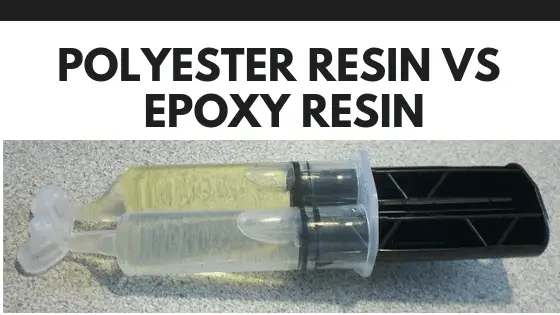Resin and epoxy both are adhesives which originally came from the heavy industry and construction. Over time their usefulness and toughness got them to be adopted on other areas as well. Today you can buy them in containers for table-topping and floors (check on Amazon), glue gun cartridges, syringes and ready to use packets
Jump to the comparison, jump to main uses, jump to the summary
Resin and epoxy are also known as plastic adhesives because they both are used to bond glass, metals, and plastics together. Resin and epoxy can also be used for assembling things, repair, and maintenance, and for engineering and manufacturing purposes. These plastic adhesives are notable due to their strong bonding properties together with insulation properties, chemical-resistance properties, and excellent heat properties.
However, their features are different from each other. But before we compare resin and epoxy let’s take a look upon the properties of each adhesive separately.
Properties of Resin
The resin is an adhesive which is available in both liquid and powder forms. We can mix the powder form of resin with water whereas the liquid form of the resin gets packaged with a powdered catalyst that us added into the mixture before usage.
Resin glues take a longer time to cure, usually around 8 to 10 hours. The temperature matters for glues to get dry. Higher the temperature of the surrounding is the less time glue takes to get dry. Resin glue provides excellent bonding that is why its usage is high in the construction industry. Resin takes a more extended period to harden; that is why this type of chemical adhesive is best in the woodworking applications which is typically a type of work that needs unhurried and careful completion. Along with wood, a resin can also get used for floor finishes, countertops, and wall panels.
Properties of Epoxy
Is epoxy different than resin? Yes. Epoxy is a bit different than resin.
It can be said that epoxy comes in a wide range of grounded form. It is used to manufacture vehicles, planes, just as games gear. Yes, it is that strong!
It is water-safe and is dissolvable free. Not only for the above-mentioned items, but It is also strong for synthetic substances and warmth. It will not be wrong to say that epoxy is a kind of oil-based glue. It is much stronger than the regular glue style pastes we use.
If we talk about its components, then Epoxy contains important materials like epichlorohydrin. This material is used to shape a hard layer that is not strong enough for cold, warm and damp surfaces.
Depending upon which brand you pick, epoxy takes between 6-30 minutes to fix. Given its quick-drying properties, epoxy is perfect for holding woods, plastics, and metals. Furthermore, this snappy drying property makes epoxy a pricey kind of glue. Epoxy isn’t only great for mechanical purposes but at the same time is excellent as to use in the family unit. With epoxy, it is conceivable to fix harmed wires and fix seats and table legs.
Always be cautious while using these materials, it can be dangerous!
Polyester resin vs. epoxy resin
Polyester resins are different from epoxy resins in many ways. Both are different in their bonding capability and resistance toward certain materials. A detailed comparison is given below. Take a look.
Composition
Polyester resin is a thermosetting unsaturated polymer resin that forms due to the reaction between polyhydric alcohols and organic acids. Whereas epoxy resins are higher molecular weight polymers or low molecular weight prepolymers which contain two epoxide groups.
Cost
Epoxy resin is more on the cost side than polyester resin due to formulation and strength requirements. You get what you have pay for.
Cure time
Epoxy resin cures when you apply thin film whereas polyester resin does not cure when you apply a thin film. Due to this reason, epoxy resin is ideal for adhesive applications whereas polyester resin is not suitable for adhesive applications.
UV resistant

Epoxies do not show resistance toward ultraviolet radiations. Some epoxy resins work well when UV resistant is get added separately. If epoxy resins are not get coated with clear UV resistant polyurethane, then they become yellowing or breakdown due to ultraviolet radiation. On the other hand, polyester resins are UV resistant, and they do not require a top coat to prevent yellowing and degradation from sunlight.
Moisture resistant
Once epoxies cured, they become moisture resistant whereas even after getting cure polyester resins are water permeable which means that water pass through polyester resin eventually.
Bonding strength
The bonding strength of epoxy resin is up to 2,000 psi whereas the bonding strength of the polyester resin is less than 500 psi.
Shrink capability
Epoxy resin does not shrink when it cures whereas polyester resin shrinks after getting a cure.
Shelf life
No doubt the shelf life of epoxy resin is excellent whereas the polyester resin’ shelf life is about six months to 1 year. As long as you have not mixed epoxy resin, you can keep it in your garage for years without losing potency whereas polyester resin becomes fragile over time.
Wear resistance
The epoxy resin shows resistance to peeling, cracking, corrosion, wear, and damage from environmental and chemical degradation. Whereas polyester resin is prone and brittle to micro-cracking.
Uses of epoxy resin
Epoxy resins are highly useable in the manufacturing of adhesives, paints, plastics, primers, sealers, flooring, coatings, and other materials and products that are get used in construction and building applications. Epoxies are thermoset plastics which are made up of the two or more industrial chemical compounds’ reaction.
Epoxy resins are get widely used in residential, industrial, and commercial construction due to their strong adhesion, toughness, and chemical resistance. Some of the epoxy resin uses are given below.
-
Structural Adhesive
Epoxies are highly known as engineering or structural adhesives. Epoxy resins are highly useable in the lamination of woods for walls, decks, roofs and other types of building applications. The usage of epoxy resin is highly remarkable for materials that require a strong bond, for example, concrete or wood. Epoxies can stick to glass, wood, stone, and some other plastic materials. Epoxies are chemical and heat resistors than most of the glues. That is why they are highly considerable adhesives for the following applications.
-
Coatings
Epoxy resin provides durability for high-gloss coatings and works perfectly as concrete floor sealers. Epoxy resin also covers another heavy-duty protective coating in industrial settings.
-
Floorings
Epoxy resins are highly usable for decorative flooring and high performance such as chip flooring, colored aggregate flooring, and terrazzo flooring. These types of floorings are available in a wide range of decorative patterns and colors that get created when you add colored quartz aggregate or contrasting vinyl chips on the top of the epoxy layer. Epoxy flooring can also get done with other additives like polymer grit or paint chips which provide anti-skid texture to the floor.
-
Architectural Surfaces
New technologies are developing sustainable countertops and architectural surfaces from a composite blending of recycled glass, post-consumer materials, and epoxies. With the development of this technology, Countertops will get made up from 90% of the recycled materials.
-
Factory casts
Epoxy paints that are water-based dry quickly and provide a touch protective coating. Their low volatility and the ability to get clean-up with water making them very useful for factory cast steel, cast aluminum, and cast iron applications, along with less risk of exposure to flammability than other alternatives which are based upon organic solvents.
Uses of polyester resin
The invention of plastics which in general polymers has led to the development of similar substances. Plastics in different solid and stiff forms are getting used in various applications. Even when you glance around, you would surely find polyester resin-based substances. In fact, your computer screen or mobile screen where you are reading this article is also made up of many polymers. Polyester resin is a substance that has several non-industrial and industrial applications. Polyester resin is a useful material that industries are using it for building, designing and crafting purposes. Some of the typical applications of polyester resins are,
-
Luggage and packaging
As discussed earlier the unique property of polyester resin to get dried into film while remaining transparent makes it an ideal material for packaging. As heat sealing and vacuum forming technology developed, some new methods of packaging which use polyester resin as a base material has also become popular. Polyester resin is ideal for luggage. One example are briefcases and suitcases which are often made up of polyester resin panel. The panels are then topped by leather or fabric to present attractively.
-
Automotive aircraft and marine
Polyester resin is often get used in the body panels of airplanes, boats, and automobiles. The lightweight of polyester resin makes it ideal for lightweight planes and racing cars. However, its water retention makes it fall out from the favors of boat builders and that is why it gets replaced with epoxy resin in boat buildings. However, sometimes for decorative purposes, the steel body panels are getting coated with polyester resin-based colorant.
-
Furnishing and appliances

Polyester resin is very common in the bonding of fiberglass inside many wet appliances including washing machines and dishwashers. Despite its association with economy models, fiberglass and polyester resin linings have an advantage over interiors of stainless steel that they do not rust or ding. The same lightweight strength property of polyester resin has made it famous in the applications of patio furniture.
Summary of the comparison:
[adinserter name=”Amazon search ad – in post – before paragraph 1″]
Polyester Resin:
- The cost of Polyester Resin is commonly not as much as Epoxy Resin.
- The Polyester gum does not cling to epoxy gum.
- Polyester Resin has a period for its usage. Its period varies from a half year – 1 year.
- Polyester Resin is very fragile, and it is inclined to smaller scale splitting. The bigger the pour, the more polyester gum shrivels when restored.
- Its prime characteristic is that it is UV protected and due do that it must not be top covered to prevent yellowing or debasement from daylight.
- The MKEP catalyst plays a vital role in it. The different quantity of the MKEP catalyst can also change the cure time of the Polyester Resin.
- Polyester Resin has a solid, combustible exhaust.
- The Polyester Resin has a specified holding strength. It is commonly restored under 500 psi.
- The polyester resin can be quickly restored because it is water porous too. The water can merely go through it inevitably.
- As an adhesive, it does not work very well.
Epoxy Resin:
- Unlike the polyester resin, the Epoxy resin is amazingly stable.
- It has incredible flexural quality. The most fantastic epoxy resins have a flexural strength of about 12,800 psi which is a lot more than the Polyester Resin.
- The cost of Epoxy Resin is far much higher compared to the Polyester
- It is a fact that its fixing time varies depending on the hardener and the temperature. Therefore, it does not have a fixed time to settle.
- It is not only non-combustible, but it is odorless too.
- Epoxy has an incredible timeframe of practical usability. The Epoxy pitches work for a half year, but it also can sensibly last something like a couple of years appropriately.
- Epoxy fixes completely when connected as a slight film, making it perfect for cement applications.
- The Epoxy also does not recoil when restored.
- Epoxy is impervious to wear, breaking, stripping, erosion and harm from substance and ecological corruption.
- Even the standard Epoxy has a holding quality of up to 2,000 psi.
- This epoxy resin has different binding powers with several substances; for instance, the epoxy will not attach itself to polyethylene, polypropylene, EPDM, anodized aluminum, Teflon or Tedlar.
